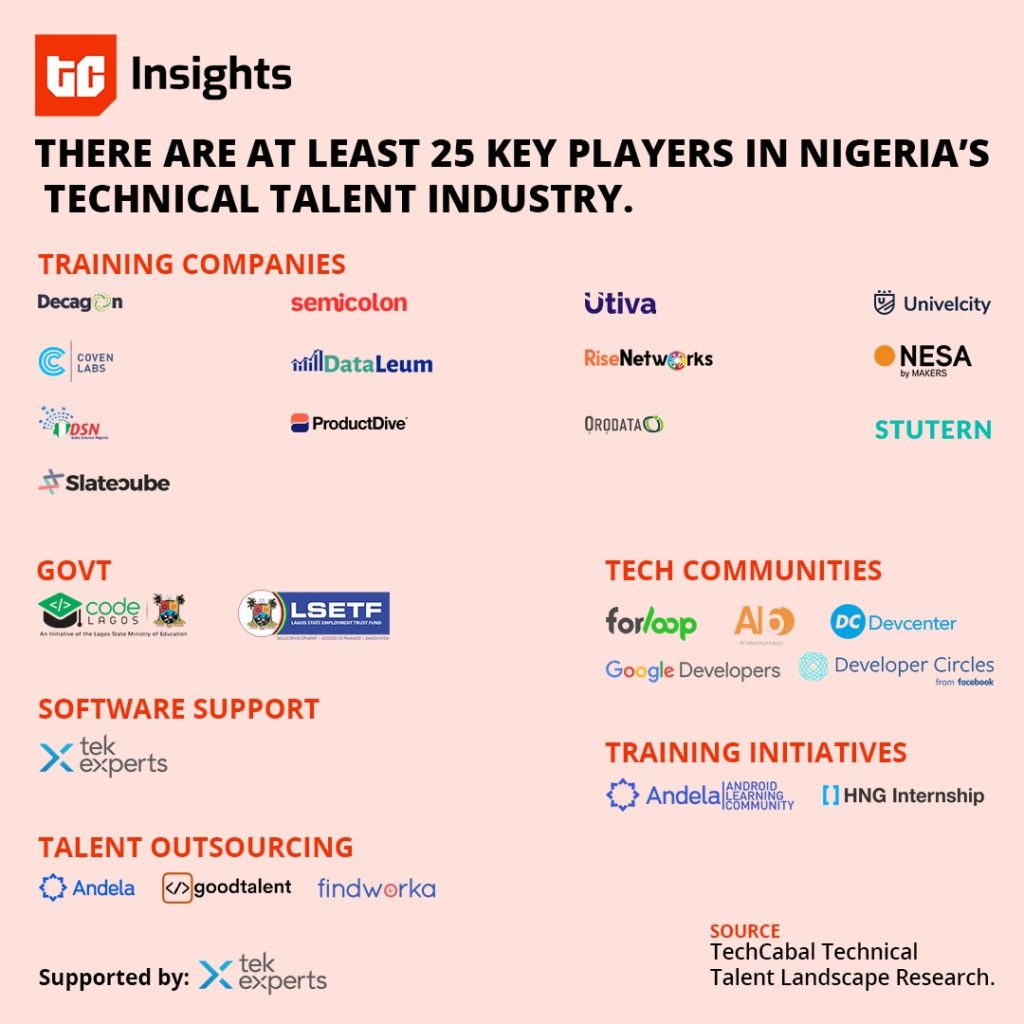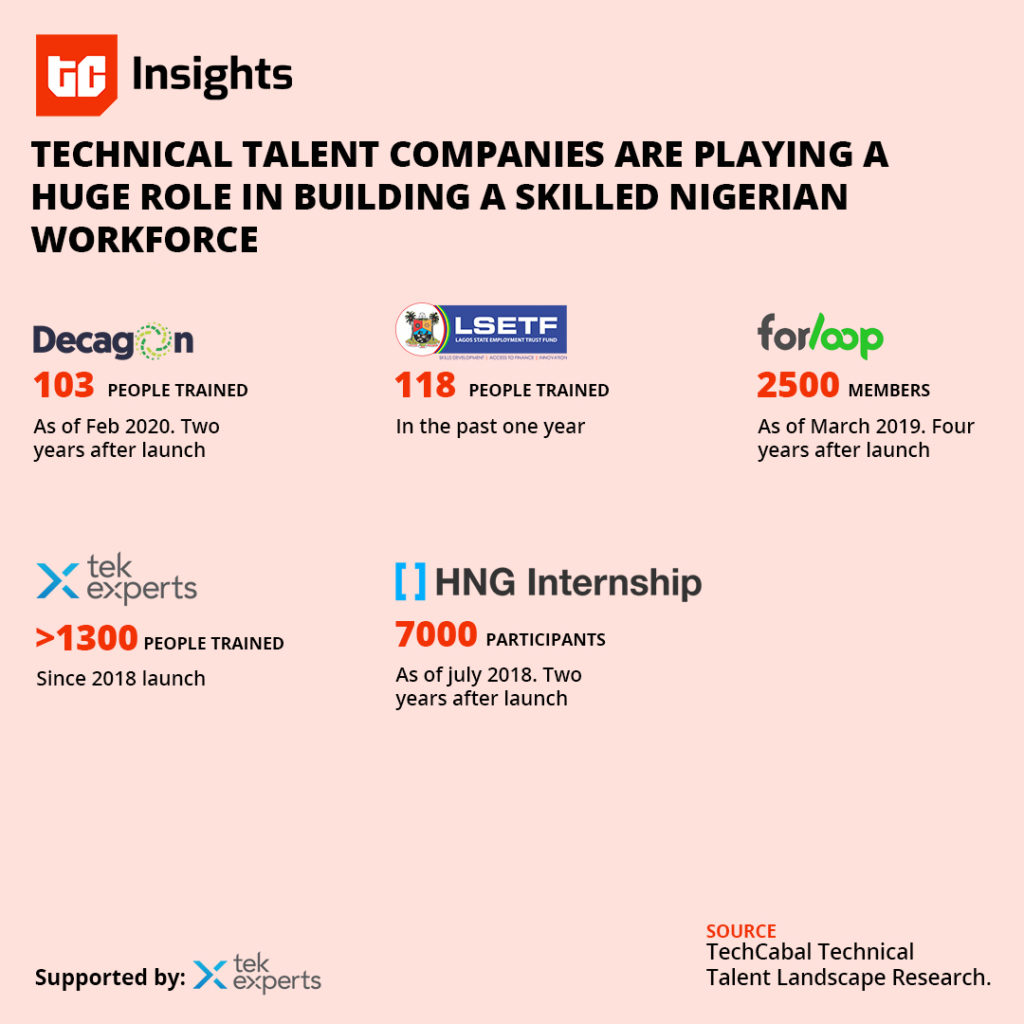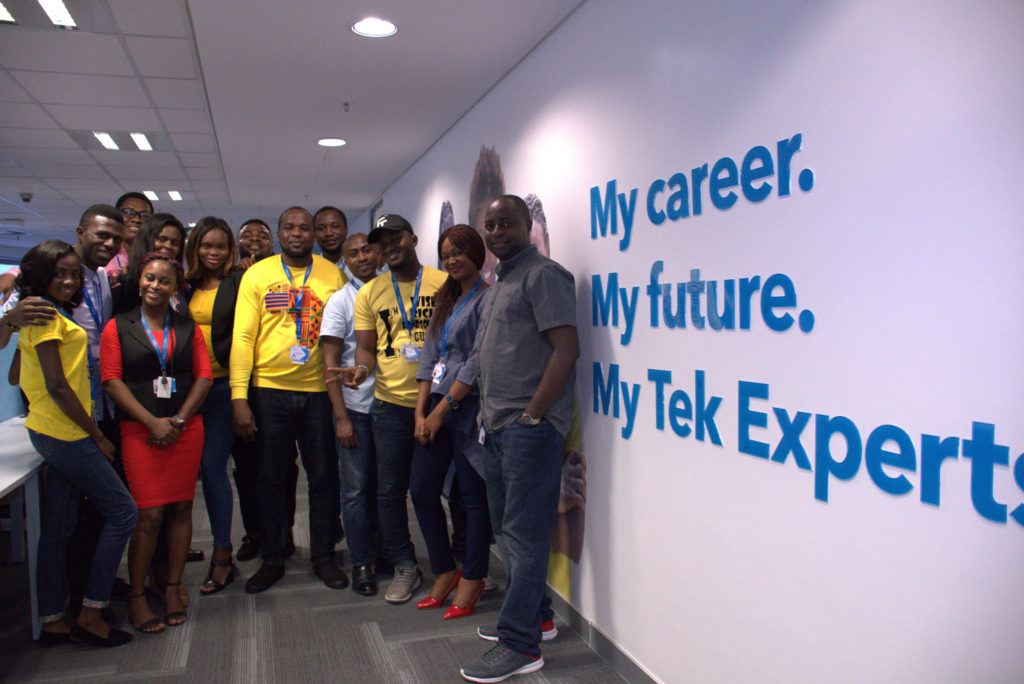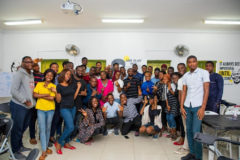Editor’s Note: This article is the second in a two-part series about Nigeria’s technical talent landscape. Read the first part here. The research in this article was powered by Tek Experts.
A lot has changed since Andela boiled the proverbial ocean. With the mantra “talent is evenly distributed but opportunity is not,” it welcomed its first cohort of aspiring developers over five years ago.
Although it no longer focuses primarily on training developers as a result of a change in business model, its impact remains. When it closed a $100 million Series D funding in 2019, it had trained and was managing 1,100 software developers.
Today, there are at least 25 companies* in Nigeria’s technical talent sector according to TechCabal’s research. These companies can generally be classified into the following categories; training companies, tech communities, training initiatives, government programs, talent outsourcing and technical software support.
Together, the skills or talent that these companies develop or manage fall into three major categories; developers, maintainers (DevOps engineers & other IT skills) and support.
For the purpose of this article, the technical talent landscape comprises organizations, startups, initiatives and communities who either support, train, recruit or supply technical talent. Universities and traditional tertiary institutions have been omitted for the purpose of this article.

Training Companies
The majority of organizations in the sector fall into this category. The category comprises companies whose business models revolve around training individuals to code or to acquire other technical skills. They typically make a fee from the training or ask individuals to repay their tuition fees after they get a job. Some of the organizations in the category include Decagon, Semicolon, Utiva and Univelcity.
Spotlight: Decagon
Decagon was founded in 2018 and has a goal to train 10,000 developers over the coming decade. Its training lasts for six months and comprises over 1,800 hours of immersive learning, 240 hours of code reviews, and 600 hours of live projects.
Candidates who take up the complete training package – boarding, daily feeding, and a monthly ₦40,000 ($110) stipend – and get a job afterwards are expected to pay back ₦3 million ($8,200) over a maximum period of 3 years. As of February 2020, Decagon had accepted 103 individuals in four cohorts and has had a 100% success rate in placing members of its first two cohorts.
Tech Communities
This category comprises developer groups that are either community-driven, backed by big tech companies or startups. Some community-driven groups include forLoop Africa and AI Saturdays.
Devcenter is a tech community comprising 9,000 technical professionals. It is driven by a startup with the same name. Tech communities backed by big tech companies include Google Developer Groups. These communities organize events that are typically the window for students and other individuals to become developers. Some of them organize trainings that teach technical skills.
Spotlight: forLoop Africa
forLoop Africa was founded in 2016 by Ridwan Olalere and has held hundreds of meetups, trainings and hackathons yearly. As of March 2019, the non-profit had a 2,500 user-strong Slack community and several chapters across eight African nations including Nigeria. It has been described as the largest developer group in the country. forLoop supports aspiring developers at the earliest stages of their career while connecting them with a larger community.
Training Initiatives
These are training programs that are contributing significantly to creating software developers. In many cases, they are not money-making initiatives and are typically a social project by big tech companies, startups or individuals. Their impact on the country’s talent pipeline is a major criterion for their inclusion in this category.
Some of the initiatives in this category include HNG Internship Program by Hotels.ng and the Andela Learning Community. Programs focused on children and teenagers can also be included in this category.
Spotlight: HNG Internship Program
The program was initially created by hotel booking startup, Hotels.ng in 2016 as a funnel to find pro developers. It eventually opened up the program by supplying developers to other organizations. As of July 2018, the program had completed four editions with over 7,000 participants. The fourth edition, HNG Internship 4.0 was done in partnership with Oracle, Figma and Bluechip Technologies. That edition had 8,000 applicants, 3,000 of those were active while 28 eventually completed the program.
Government Programs
Training initiatives backed by the government including Code Lagos and the Lagos State Employment Trust Fund (LSETF) are also an integral part of the sector. While the LSETF works with several partners to provide young people of employable age with technology skills, CodeLagos teaches coding skills to children at the primary school level.
Spotlight: LSETF’s Lagos Innovates Talent Development Program
LSETF’s Lagos Innovates Talent Development Program was launched in partnership with Honeywell Group in 2019 and the program engaged Univelcity and NESA by Makers Academy to provide training in frontend design & engineering, python programming for web and data science, full-stack development with JavaScript and full-stack development for mobile applications.
When the program launched, there were about 200 applications. After pretests and interviews, only 18 of those made it into the program. Some of the people from the first cohort work for organizations such as PwC, Chekkit Technologies, AJO Card, etc.
Asides the Lagos Innovates Talent Development Program, the LSETF also has an Employability program which provides technical skills training. According to Oluwaseyi Ladejobi, Head of Employability, the program has trained 226 young people in Digital Skills, out of which 100 were enrolled for UI/UX. It has also matched 52% of them with jobs, while about 5% are currently self-employed . This year, it expects to train 150 people in a new partnership with Lofty Inc Allied Partners. Backed by the USADF, modules will include Cloud Computing, Virtualization, Cyber Security and Software Engineering.

Talent Outsourcing
Since it pivoted its business model, observers and pundits have struggled to continue to categorize Andela as a training or education company. Although it continues to train coders, its business model no longer depends on training. Andela now finds and recruits the best senior developers and connects them with foreign companies who need them. This fits neatly into the talent outsourcing category. Goodtalent and Findworka are some of the other companies that can be classified as talent outsourcing companies.
Software Support Companies
In Nigeria today, Tek Experts and some business process outsourcing companies are in this category. They serve the most important segment; end-users. Many end-users of software products typically run into issues that require deep technical skill to resolve them. This is the gap software support companies fill.
While the companies/organizations in other categories focus primarily on coders and training them, software support companies recruit, train and supply support engineers.
Spotlight: Tek Experts
Tek Experts officially launched in Nigeria in 2018. In partnership with Microsoft, it set up a world-class customer service and a technical support centre in Nigeria. It is a global provider of business and IT support services and a developer of technologies that enhance the customer experience. Tek Expert’s services include deep technical software support, customer success, and professional services.
“We provide technical support and IT services to global IT companies that roll out services and products,” says Ashim Egunjobi, Head Of Business Development, Africa at Tek Experts. One of its major clients is Microsoft and its engineers support some of its technologies.
Tek Experts recruits and trains young people to become technical support engineers. Its training program comprises both physical and virtual instructor-led training focused on both soft and technical skills. Its training program became virtual-first because of the coronavirus pandemic
“Part of the work we do is to be part of the process where we train world-class technical support engineers to be able to do their jobs. We cover the whole range from soft skills to specific technical trainings to introduction to the technologies we support,” Adeyemi Adelekan, Tek Experts’ Site Learning and Development Manager explains.
“Our training is so robust, it takes into consideration every single step a person needs to take before they become a world-class technical support engineer,” Adelekan concludes.
Tek Experts currently has about 1,300 engineers in Nigeria and over 6000 employees across 6 countries, supporting clients across the globe. More trainees have gone through its program and worked with the company as technical support engineers.

The Future of Nigeria’s Technical Talent Landscape
Beginning with Andela’s pivot to hiring and supplying senior developers while local companies like Decagon continue to create them, Nigeria’s technical talent landscape is redefining itself. The local demand, as well as competition, will largely impact the future of the sector. One major theme has been the export of locally trained developers abroad.
As the developers minted in the last five years advanced their skills and built their portfolio, they’ve been able to find lucrative jobs in Germany, Canada and other countries. The migration of these developers has an impact on the quality of talent available at home. The key challenge is how the sector can quickly create and grow the talent required to meet local demand.
“When we first started Lagos Innovates and we were talking about talent, one of the things that came up was that if we train all these people and they move to Canada or take remote jobs from foreign companies, how will that contribute to the state’s tax base?” Tosin Faniro-Dada, explains.
“Our argument was that it is our job to ensure that the ecosystem is viable and rewards them enough to stay in Nigeria. We need to show them that we value them and their skills,” Faniro-Dada added.
Asides, global competition for talent, new types of jobs and work format will define the sector’s future. Emerging technologies including artificial intelligence and blockchain mean that new skills will be needed. For example, the need for data scientists has bred a new set of local training companies focused on providing those skills. The ongoing health crisis has also accelerated the rise of remote work. Remote work will rise as the default job format. This introduces new dynamics.
“For the future, I believe collaboration tools and technologies that foster remote work are going to gain momentum,” Ashim Egunjobi says. “AI, machine learning, natural language processing platforms are going to gain momentum too and will be important for companies to more efficiently and effectively recruit and grow ,” she concludes.
As more products/services continue to enter the market, there might be an increase in the need for more technical support engineers to maintain and resolve deep technical issues as it relates to the products and its customers. One can expect a year on year increase in this IT segment.
“Within the next 5 years, Tek Experts Nigeria expects to have about 2000-3000 technical support engineers in its employment,” Egunjobi tells TechCabal.
While demand for talent is expected to grow, justifying the sector’s essence, it will need to overcome some challenges. These challenges include infrastructure namely broadband access, power and credit.
To solve the problem, training companies and initiatives including LSETF’s, are creating their own loan programs. However, improving credit infrastructure will help technical talent companies focus on their core business.
A lack of access to affordable broadband also means that lower-income individuals can’t access training programs and job opportunities. In addition to infrastructure, the sector also requires government support to scale their programs.
“The most important thing here is that we must have policymakers who understand the need to continue to leapfrog so that we can catch up. If you compare say Nigeria or Kenya or Rwanda with countries in Asia such as Taiwan or Japan, who are hugely technologically advanced; we have a lot of leapfrogging to do,” Egunjobi says.
“This starts with infrastructure and continuous education and unless we invest in both areas, we are going to continue to see brain drain and challenges with competing globally,” she adds.
Although Nigeria’s technical talent landscape has made significant progress in the last two decades, its future lies ahead. It will be defined by the global competition for talent, demand for new skills, policy support and infrastructure development.
*While we’ve put together a list of some of the key players, it is not an exhaustive list of players in the space.
Download the full article in PDF format here.





















